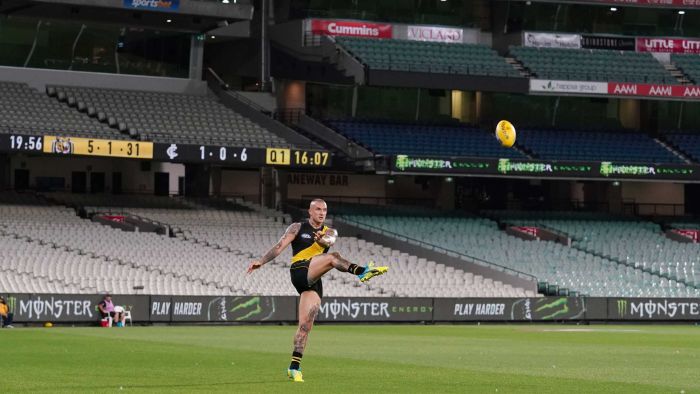In accordance with tradition, the final episode of the ABC’s Offsiders for 2020 will reflect upon the events of the previous 12 months.
While normally this is a matter of sorting through the customary triumphs and tragedies, identifying heroes and villains and squabbling about respective merit on partisan lines, this year’s retrospective will be, yes, unprecedented.
Do we dwell on the sport that was played between COVID disruptions and in unusual circumstances, or the events that were not?
Do we lament the postponement of the Olympics and Wimbledon, or elevate to even greater heights the feats of the Australian Women’s cricket team, Melbourne Storm, Richmond, Dylan Alcott, the Melbourne Vixens, Sydney FC and so many others given the tumultuous disruption to their customary routines?
Did we find sport trivial and even irrelevant as COVID-19 took lives and destroyed economies, or were the extraordinary measures taken to get players on the field a measure of its importance?
Any reminiscence of 2020 will begin with the eerie sight of games played in empty stadiums during that mid-March twilight zone when the pandemic had descended but we had not quite grasped its full implications.
Then the great sporting drought — the hiatus during which we did not merely ponder life without professional and recreational sport but its absence became a reality of our newly distanced and isolated lives.




As we binge-watched The Last Dance and YouTubed old games, we became acutely aware of how the sports industry is now geared as a content producer; and how with no content to produce its future was imperilled.
So, just as former New York mayor Rudolf Giuliani made his name after the 9/11 attack, Peter V’landys was transformed on the national stage from cashed-up troll of the Victorian racing industry to Churchillian COVID-time leader.
Wearing an expensive suit like a superheroes cape, V’landys initiated Project Apollo, a seemingly preposterous title given any previous association between rugby league and the moon had involved cases of indecent exposure.
Yet, after huffing and puffing his way through government red tape, V’landys met his seemingly ludicrous May 31 relaunch date and was proclaimed saviour of his beloved “rugba league”.




In that context, it will seem grudging to mention the NRL’s TV audience plummeted — at least partly because of the Brisbane Broncos’ miserable season — and that the full impact of funding shortfalls due to renegotiated media rights deals are yet to be felt.
There seemed to be a significant propaganda advantage for the NRL in beating the AFL back onto the field by two weeks, although the AFL might counter that its occupation of Queensland during the Broncos’ dismal season had greater impact in the “battle of the codes”.
The AFL’s Gabba grand final was a gift to Queensland Premier Annastacia Palaszczuk for her generous hospitality, albeit strained by players breaking quarantine to scoff kebabs on the Gold Coast strip and insensitive vision of AFL families frolicking in their quarantine resorts.
Whether you believe AFL chief executive Gill McLachlan and his executives were heroic in keeping the competition going or this was the season in which they finally earnt their lavish salaries, the AFL also faces significant challenges next season.
The first will be to return the game to a sense of normality and to avoid the temptation to repeat COVID-season innovations such as the “festival of footy” fixture that pleased broadcasters but left players hopelessly fatigued.




Across sports, administrations and club rosters were slashed as budget forecasts shrank, with Cricket Australia’s decision to pre-empt losses with savage staff reductions and stand-downs inevitably leading to the downfall of chief executive Kevin Roberts.
The ARU’s Raelene Castle and the NRL’s Todd Greenberg were also dumped, Castle the victim of her game’s byzantine politics and Greenberg seemingly surplus to requirements as V’landys took the tiller.
COVID also claimed some big reputations. Novak Djokovic’s misguided conduct of the toxic Adria Tour seemed to rev up the karma bus that mowed him down when he was disqualified from the US Open after hitting a linesperson with a ball.




More happily, the pandemic did not completely stop the momentum enjoyed by women’s sport, with Australia’s victory in the T20 World Cup and the hosting rights for the 2023 FIFA Women’s World Cup potentially game-changing achievements.
Belatedly, Super Netball continued to thrive in its hub despite the gimmickry of the two-goal super shot that fiercely divided opinions; and we still have world number one Ash Barty up our sleeves.




A year in which the Masters and State of Origin was played in November would always be discordant, but there was also the familiar triumphs and tragedies.
Dean Jones, who defined the growth of one day international cricket for many; Kobe Bryant, the face of the NBA in the immediate post-Jordan era and Diego Maradona, whose genius exceeded even his greatest excesses, were mourned.
We continued to fumble with idea of sport as a means for change. The Black Lives Matter protests divided opinions between those moved by the powerful symbolism of athletes taking a knee and those who fail to understand, or at least acknowledge, the already symbiotic relationship between sport and politics.
But most poignant was how the absence of sport reminded us of its most abiding virtue — the way it brings people and communities together.
Of all the Offsiders episodes this year, the most memorable was that which portrayed the devastating impact the postponement of sport had on the small towns where the local ground is an important gathering place.
In those weeks when the footy fields and netball courts were empty, the scoreboards unattended and the canteens unmanned, we remembered that sport is not in its essence an industry, it is a way of life.
Offsiders will have a full review of the year in sport including all the latest news this Sunday at 10:00am on ABC TV.







